Camp Care-a-Lot: Kindness and Compassion in the Classroom

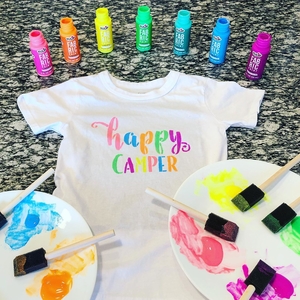
What would it look like to put caring and compassion at the top of our school agenda?
For Jessica Cronck, a teacher at Peachland Elementary School in the Central Okanagan, it looks like inviting her Kindergarten/Grade 1 students to “Camp Care-a-Lot”, where learning takes place through outdoor education and a focus on well-being. Acknowledging the challenges and hardships students everywhere have experienced since schools closed earlier this year, Jessica has transformed her classroom into a “tent party” and adjusted her approach to prioritize social-emotional learning, joy, and connection more than ever before.
Camp Care-a-Lot has a distinctly summer camp feel, but with a social-emotional learning twist: students are referred to as “Happy Campers” (and have the t-shirts to prove it), building sand castles and blowing bubbles are woven into the curriculum, and days are structured around caring for self, others, and the environment.
These three types of caring are at the heart of Jessica’s back-to-school philosophy. In Jessica’s own words,
“To care for ourselves, we start each morning with guided breathing. We choose a healthy morning snack from our lunch to pack for our picnic. We get exercise and fresh air on our hikes in the forest and walks to the beach. We end the day with a gratitude circle.
To care for others, we practice spreading kindness like confetti. We blow bubbles at the beach and park and wave and say hello at people passing by. We will be painting rocks with positive messages and writing letters/making art for essential workers.
To care for the environment, we pick up litter, appreciate but not pick flowers, care for animals, learn about animals and how we can protect them.”
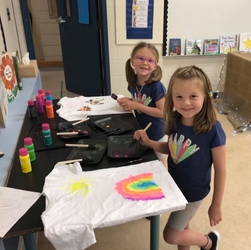
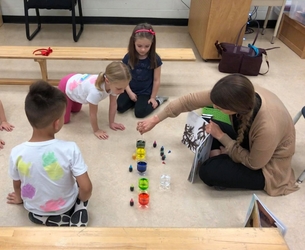
Above right: Central Okanagan School District SEL teacher Sara Manana reads “The Colour Monster” to teach children about their feelings and how to listen to their bodies.
After only one week at Camp Care-a-Lot, students are taking kindness seriously. A special moment of compassion left its mark on both teacher and students when the Happy Campers showed deep concern for abandoned butterfly eggs and sprang into action to help them:
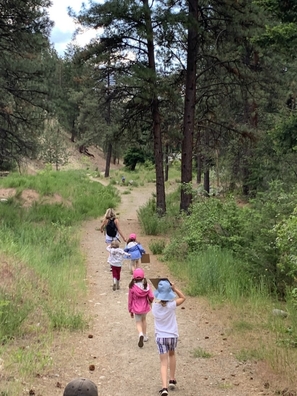 “One morning the children came running in from recess. They had two leaves with butterfly eggs on them[…]We had been learning about taking care of nature and my students were very concerned. One was worried that the mommy butterfly would return and not be able to find her babies. Another was worried that the eggs would hatch into baby caterpillars that wouldn’t be able to find their mom.
“One morning the children came running in from recess. They had two leaves with butterfly eggs on them[…]We had been learning about taking care of nature and my students were very concerned. One was worried that the mommy butterfly would return and not be able to find her babies. Another was worried that the eggs would hatch into baby caterpillars that wouldn’t be able to find their mom.
Luckily, I had a butterfly net in one of my classroom bins. The children wanted to put the leaves with the eggs in it so that they could care for them. The children decided they needed to add natural materials to create a habitat in the net. Next, they were brainstorming what the caterpillars and butterflies would need for food. It’s heartwarming to see how caring and empathetic they all are.”
It comes as no surprise that Camp Care-a-Lot is profoundly impacting students’ hearts and minds. Educators everywhere are welcoming back children who have experienced some degree of stress, uncertainty, and disconnection in light of the COVID-19 pandemic. Re-opening schools presents the opportunity to create a physically and emotionally safe space for children and youth to process and find solidarity in their experiences, particularly when they are supported by adults who prioritize their heart-mind well-being.
“With everything that’s going on in the world, I’ve had lots of time to reflect on my role as an educator. Yes, curriculum and assessment are important, but children’s well-being must come first. Social-emotional learning is at the heart of my practice and I created “Camp Care-a-Lot” as a way to support my student’s well-being.”
While Camp Care-a-Lot may not be on the horizon for your classroom, there are many diverse and accessible ways to cultivate a culture of caring.
The DLC would love to hear how YOU are bringing caring into the classroom – comment below or connect with us on social media via Facebook (@dalailamacenter) or Instagram (@dalailamacenter).
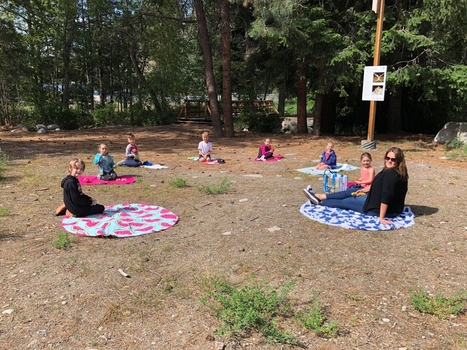







Comments
Post new comment